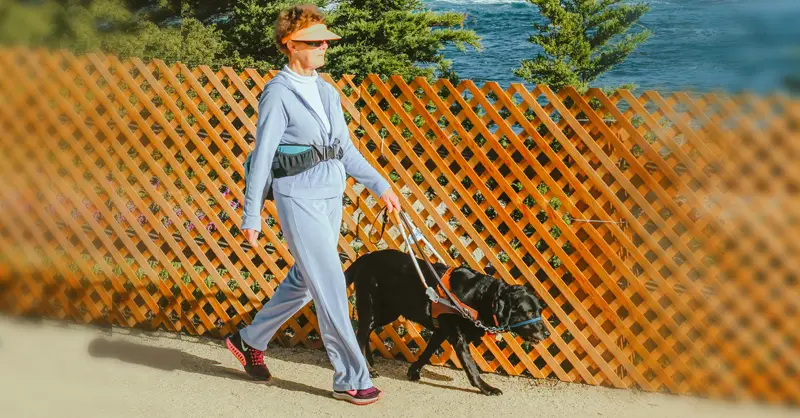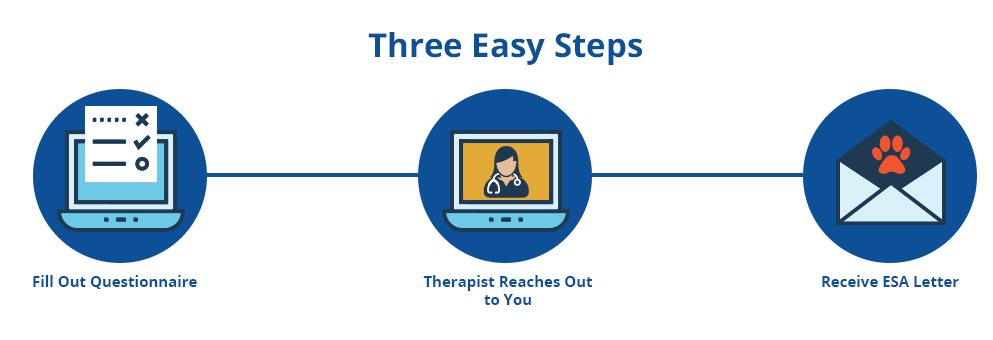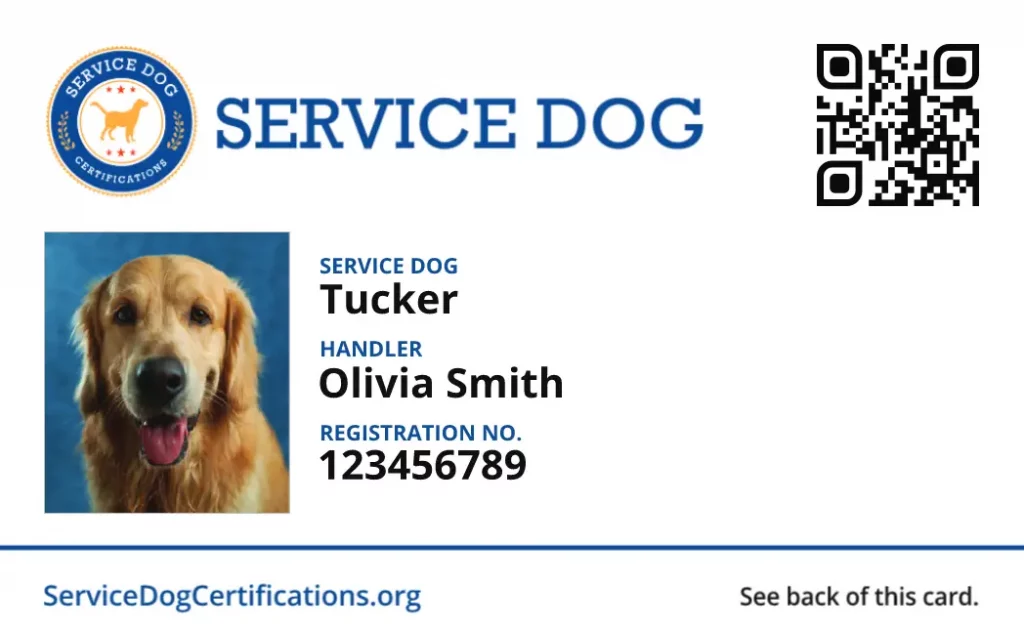Home Page › Blog › California Service Dog Requirements
California Service Dog Requirements

California allows people with disabilities to live, travel, and go about their daily lives in the presence of a service dog. Service dogs are afforded certain rights in the State of California that allow them to access public spaces that normally don’t allow pets.
Californians are protected by both federal and state laws, including under the Americans with Disabilities Act (ADA) as well as California’s Unruh Act (Civil Code, sections 51–51.2) and Disabled Persons Act (Civil Code, sections 54–55.32).
Read on for more information on California Service Dog requirements and regulations.
Definition of a service dog
Service Dog: Any canine trained to perform a disability-specific task for a person with a physical or psychiatric disability.
Service dogs used for mental health conditions are known as Psychiatric Service Dogs.
What is a disability: For legal purposes, disability is defined as a physical or mental impairment that substantially limits a major life activity (such as the ability to work, socialize, or attend school). Physical disabilities include health issues like limited mobility, visual impairment, seizures, and hearing loss. Qualifying psychiatric conditions include debilitating depression, chronic anxiety, PTSD, autism, and learning disabilities, among others.
How is a service dog trained?
To be considered a service animal, a dog must be individually trained to perform a job or task-specific to the handler’s disability.
Federal vs California rules: One difference between California’s rules and the ADA is that service dogs in training are not covered under the ADA. However, under the California Disabled Persons Act, individuals who train service dogs can bring their animals to any public place in order to train the dog and provide a disability-related service.
Who can train a dog: Dogs can be trained by the person with the disability, by a professional trainer, or with the help of a training organization. Note that in California, it is perfectly acceptable for a handler to train a service dog on their own.
Identification requirements for service dogs in California
Visible identification: Most service dog owners use service dog paraphernalia like ID cards, vests, tags, and certificates to signal to others in public that their dog is special. It is not mandatory either under California or federal rules to have an identification card or vest on your Service Dog, but handlers frequently use them for personal convenience. These items can prevent intrusive inquiries and unwanted interaction with the service animal while on duty.
Disability verification: Staff at venues and landlords cannot demand documentation as a condition of entry. In California, they can ask two questions to validate whether you have a service dog (and only if the disability is not obvious):
1. Is the animal a service dog required for a disability?
2. What work or task has the service dog been trained to perform?
Service dog registration in California
California does not require the registration of service dogs. There may be registration requirements that generally apply to all dogs that reside in your area, but they are not service-dog specific. Service dog owners, however, choose to voluntarily register their dogs for several reasons.
What it’s for: Registering a service dog with a service like Service Dog Certifications enters the dog’s information into a searchable database linked to an ID card. The ID card can be used as one way to signal to others that you own a service dog or be presented when third parties unaware of service dog verification rules continually insist on seeing documentation.
Psychiatric service dog requirements
Psychiatric service dogs are recognized as service dogs in California with all the same rights and benefits of ownership.
Psychiatric service dogs are still not well appreciated by the general public but are a growing category of assistance animals.
California considers the following as psychiatric disabilities if they substantially limit a major life activity:
- Post-Traumatic Stress Disorder
- Anxiety Disorders
- Depression
- Obsessive-Compulsive Disorders
- Personality Disorders
- Schizophrenia and Schizoaffective Disorder
- ADHD
- Autism
Psychiatric service dogs can perform an amazing number of tasks, including:
- Deep pressure therapy
- Reminding the owner to take medication
- Posting and watching the owner’s back in open areas
- Tactile stimulation
- Alerting the owner to oncoming threats or episodes
- Disrupting repetitive self-destructive behaviors
Service dog vs emotional support dog in California
California also recognizes emotional support animals as a type of assistance animal. An emotional support animal (ESA) alleviates symptoms of a mental or emotional health condition.
SD vs ESA: There are major differences between ESAs and service dogs.
- ESAs do not require any specialized training.
- ESAs are protected under the Fair Housing Act, not the ADA, so the benefits extend primarily to housing rights and do not come with public access rights.
- While service dogs can only be dogs, ESAs can be dogs, cats, birds, gerbils, fish, turtles, and other small household pets.
To qualify for an emotional support animal in California, you need an ESA letter from a California-licensed mental health professional. See if you qualify for an emotional support animal letter by completing the online questionnaire below.

You and your service dog in California
Service Dog handlers in California have generous rights. These include:
- Public access (venues, outdoor areas, etc.)
- Access to public transportation
- Access to aviation (including in the cabin on airplanes)
Having a service dog in California is a major responsibility. Properly training a service dog can be challenging, and service dog owners are expected to have their animals under control at all times. Of course, as a reminder, California law prohibits misrepresenting a pet dog as a service dog.
As a service dog owner, it’s important to be aware of your rights and how to conduct yourself during proper service dog verification requests by third parties. Registrations, certificates, ID cards, tags, and vests can’t replace these procedures, but they can help ease the process and give the public an easy way to recognize your companion as a service dog.
About the Author: The writing team at Service Dog Certifications is made up of folks who really know their stuff when it comes to disability laws and assistance animals. Many of our writers and editors have service dogs themselves and share insights from their own experiences. All of us have a passion for disability rights and animals.
135 comments
Leave a Reply Cancel reply
Latest Posts

How to Bring a Service Dog to Disneyland
Trained service dogs are more than welcome to join their handlers at Disneyland. In this guide, we’ll explain Disneyland’s policies and give practical advice for bringing a service dog to Disneyland for the first time. Disneyland’s Service Dog Policies The Magic Kingdom is happy to welcome trained service dogs across most park locations! They kindly […]

Read More

Can Dogs Eat Tomatoes?
Yes! Dogs can safely enjoy tomatoes, but there are a few risks to be aware of so you can feed your dog responsibly. Fully ripe tomatoes (without the stems and leaves) can actually have nutrients that are good for your pup. Tomatoes have chlorogenic acid, an antioxidant that can have anti-inflammatory effects in cells. They’re […]

Read More

Can a Primary Care Doctor Write an ESA Letter?
Your family doctor, also called a primary care physician (PCP), can write a letter recommending an emotional support animal. We’ll explain what legally gives them that ability and explore what better options might be available for you. Why are Physicians Able to Write an ESA Letter? To turn your pet into an emotional support animal, […]

Read More









How young can a service dog be?
The dog should be at least 6 months old and have outlived the puppy age to qualify as a service dog. However, if the dog is eager to learn, then the training can start at any age. You may find this article on service dog requirements interesting https://www.servicedogcertifications.org/service-dog-requirements/
To whom it may concern,
I’ll share my challenge and hope you’ll be able to help.
My friend dog kobi is an emotional support dog.
he is with him everywhere He go, keeps him come at a all kinds of stressful situations that life throws at us and basically there him at all times .
A few days ago when he wanted to buy a plane ticket for them to fly celebrates his birthday with family and friends he sadly discovered that the law has changed and when a dog is recognized as an emotional dog it’s not enough to get him on a plane with him.
As a result he dropped the idea of going there and won’t be able to get a real celebration for his birthday.
It’s very important for him to register kobi from “just an emotional dog “ to a service dog so he can keep his normal come lifestyle , take it with him places and most of all his other celebration experience will be better.(a specially on days like this who’s not easy days to anyone).
Kobi is a sweet discipline gentle dog.
What is the quickest easiest process for him to make it a registered service dog?
I’ll appreciate you contact me by mail with an helpful answer as quickly as possible
Sincerely yours,
Inbal
Kobi sounds like a great dog with service dog ambition. However, an ESA doesn’t simply switch to become a service dog. Service dogs need extensive training to fulfill a task that the handler cannot complete due to their disability. This training usually takes months to complete. The owner must self-certify that their dog has been trained to perform tasks relating to their psychiatric disability. Once the service dog is fully trained, it cannot leave the handler’s side as it has become a part of their daily life. You may find this article on how to make your dog a service dog interesting: https://www.servicedogcertifications.org/how-to-make-my-dog-a-service-dog/
Examples of such work or tasks include guiding people who are blind, alerting people who are deaf, pulling a wheelchair, alerting and protecting a person who is having a seizure, reminding a person with mental illness to take prescribed medications, calming a person with Post Traumatic Stress Disorder (PTSD) during an anxiety attack, or performing other duties. Service animals are working animals, not pets. The work or task a dog has been trained to provide must be directly related to the person’s disability. Dogs whose sole function is to provide comfort or emotional support do not qualify as service animals under the ADA.
I suffer from anxiety and depression, I have been researching if I qualify for a service dig, but I can’t find a solid answer, it says I do but I don’t at the same time? I just need a solid answer, if someone can give it to me please leave a reply.
You might qualify for a Psychiatric Service Dog. But you may find this article on service dogs for anxiety interesting https://www.servicedogcertifications.org/service-dog-for-anxiety/ .
Hello. JG. My son has issues of anger management, and self-harm also. Where did you have your dog trained?? Also what techniques does your dog use to alert you, and what do you do when alerted (time out, take meds, etc.?) My son needs a service dog but how to describe the service he can’t do for himself (to qualify as a “service dog?”
LF
Anger management is not considered a disability under the ADA nor is self harm considered a disability under the ADA. So your son doesn’t qualify for a service dog. Unless your son gets a specific diagnosis from a licensed doctor and that diagnosis must is considered a diagnosis under the ADA your son will not qualify until he gets a valid diagnosis and until the diagnosis is actually considered a disability.